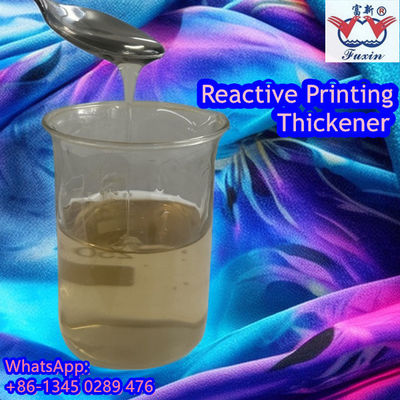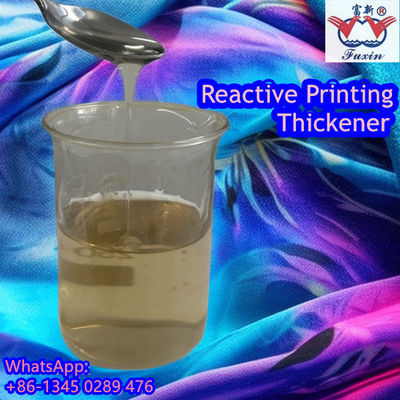Product Description:
Reactive Printing Thickener is a chemical additive crafted especially for use in the textile industry when they are reactive dye printing. It is created to enhance the viscosity and rheological characteristics of printing pastes to ensure improved and exact printing on different fabrics.
This chemical additive has many advantages. Firstly, its improvement in the viscosity of a printing paste makes it possible to have better control and stability of the printing process. This improves the clarity and fineness of the designs printed. Moreover, its strong binding characteristics also assist in keeping the colors bright and vibrant on the fabric.
Features:
Sodium carboxymethyl cellulose aqueous solution has many favorable features. It is clear, transparent, homogeneous, and has a steady viscosity regardless of mechanical force. The stored size tanks will not be affected by temperature or bacteria, so the solution is always readily available for production needs. It also has high viscosity and film-forming properties, which allows it to create a smooth, wear-resistant, and flexible film on warp, as well as offers a soft hand feel.
Moreover, when sodium carboxymethyl cellulose aqueous solution is used to process yarn, it will not be prone to yellowing and mildew, avoiding any possibility of defective spots or greasy dirt. It can also remarkably decrease the usage of desizing agents and simplify the machinery list and control instrument, leading to a better sanitary condition of the workshop.
In conclusion, sodium carboxymethyl cellulose aqueous solution isn't just able to create a higher quality fabric, but also enhances the production capacity and reduces expenses. It is a suitable and cost-efficient choice for many businesses.
Technical Parameters:
Performance of Ultra High DS CMC


1st pic:Dyed color granular CMC 2% solution
2nd pic: The left is standard product made in Italy. The middle and right are Fuxin different types of CMC.
Specification
| TYPE |
Degree of Substitution (DS) |
Viscosity
(Brookfield,1%soln.,20℃)
|
pH |
Moisture |
Particle Size |
| 10H |
1 |
2500-3000cps |
6.5-8.5 |
≤15% |
20-70 mesh |
| 13H |
1.3 |
1500-2500cps |
| 15H |
1.5 |
1000-2000cps |
| 18H |
1.8 |
800-1600cps |
| Y002 |
2 |
800-1500cps |
| Y230 |
2.3 |
600-1000cps |
*Kindly contact us for specification and information about any specific grade of CMC other than mentioned in the above table.
Powder or granular available, we recomed customer to purchase the brown granle type CMC to sell as sodium alginate for higher profit.
Technique Process
▲Dissolve the dyes and add into the paste, make the color paste with thickener→▲Printing→▲Drying (100 ℃)→▲Baking or steaming→▲Washing→▲Soaping→▲Rinsing→▲Post treatment procedure.
Dissolution Methods and Proportion:
How to make the paste?
1. The ratio depends on DS level, low DS product should mix with pure sodium alginate to reach a better performance, while ultra high DS product can 100% replace SA.
2. Proportion: same as sodium alginate original paste preparing. Firstly add 65% water, stir the water while adding the product evenly and slowly, then speed up the stirrer for 20-25 minutes. And then add the remaining 35% water, stir for another 20-30 minutes. Leave for 15 minutes.
How to make sure the paste dissove completely?
1. Powder and water completely fuse, not exist solid-liquid separation phenomenon.
2. Paste is dissolved evenly, the surface is smooth, no granular objects.

Applications:
Textile Printing
Reactive Printing Thickener is extensively used in textile printing, particularly for reactive dye-based printing methods. It is employed to thicken the printing paste, allowing for precise and controlled application of dyes onto fabrics. The thickener enhances the viscosity and rheological properties of the paste, ensuring sharp and well-defined printed designs.
Fabric Decoration
Reactive Printing Thickener plays a crucial role in fabric decoration by enabling the creation of vibrant and intricate patterns. It facilitates the bonding of reactive dyes with fabric fibers, resulting in excellent color fastness and resistance to fading. This makes it suitable for a wide range of fabric types, including cotton, rayon, silk, and blends.
Apparel Manufacturing
Reactive Printing Thickener is widely used in the production of printed textiles for apparel manufacturing. It allows for the creation of unique and visually appealing designs on garments, such as t-shirts, dresses, and scarves. The thickener ensures consistent and uniform printing results, enhancing the overall quality and aesthetic appeal of the finished products.
Support and Services:
Reactive Printing Thickener offers a comprehensive technical support and service for our customers.
We provide a team of technical engineers to offer online and offline support, including:
- Technical advice and assistance for product selection and application
- On-site troubleshooting and maintenance
- Equipment inspection, repair and upgrades
- Training and product demos
We also offer a wide range of resources for customers, including:
- Product specifications and safety datasheets
- Application guides and instructional videos
- Product manuals and troubleshooting guides
- Software updates and bug fixes
If you have any questions or require assistance, please contact us and we will be happy to help.
Packing and Shipping:
Reactive Printing Thickener must be packaged correctly for reliable and secure shipping.
- Store the product in a cool, dry, and well-ventilated area.
- Use a non-corrosive container made of stainless steel, aluminum, or plastic.
- Package and seal the product to prevent contamination and prevent leakage.
- Label the package clearly with the name of the product, the date the product was packaged, and the expiration date.
- Ship the product on a pallet or in boxes.
- Secure the product with straps or other methods to prevent movement during transport.

 Your message must be between 20-3,000 characters!
Your message must be between 20-3,000 characters! Please check your E-mail!
Please check your E-mail!  Your message must be between 20-3,000 characters!
Your message must be between 20-3,000 characters! Please check your E-mail!
Please check your E-mail! 



